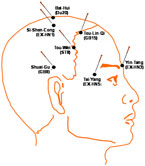New research demonstrates that acupuncture is effective in relieving depression and increases the therapeutic effect of fluoxetine (Prozac, Sarafem, Fontex). Researchers employed a single-blind, randomized, sham-acupuncture controlled study to determine if a type of electroacupuncture called DCEAS (dense cranial electroacupuncture stimulation) “could enhance the antidepressant efficacy in the early phase of selective serotonin reuptake inhibitor (SSRI) treatment of major depressive disorder (MDD).”
 Acupuncture for DepressionSubjects suffering from depression received 9 electroacupuncture treatments combined with the oral administration of the SSRI fluoxetine. The results were compared with subjects receiving a non-invasive simulation of electroacupuncture stimulation (sham-acupuncture) plus fluoxetine. The results were tabulated and the researchers concluded that electroacupuncture stimulation increased the clinical effectiveness of fluoxetine. They noted that electroacupuncture “is a safe and effective intervention that augments the antidepressant efficacy. It can be considered as an additional therapy in the early phase of SSRI treatment of depressed patients.”
Acupuncture for DepressionSubjects suffering from depression received 9 electroacupuncture treatments combined with the oral administration of the SSRI fluoxetine. The results were compared with subjects receiving a non-invasive simulation of electroacupuncture stimulation (sham-acupuncture) plus fluoxetine. The results were tabulated and the researchers concluded that electroacupuncture stimulation increased the clinical effectiveness of fluoxetine. They noted that electroacupuncture “is a safe and effective intervention that augments the antidepressant efficacy. It can be considered as an additional therapy in the early phase of SSRI treatment of depressed patients.”
The authors initiated this investigation citing numerous studies and recent meta-analyses demonstrating that acupuncture “is efficacious for various types of depressive disorders.” Citing the research, the investigators note that electroacupuncture’s rapid effects in the treatment of major depressive disorder (MDD) are due to the “direct modulation of multiple central neurochemical systems, especially the brainstem adrenalinergic (NA), serotonergic (5-HT) neuronal and hypothalamic neuroendocrine systems….” Consequently, the investigators chose dense cranial electroacupuncture (DCEAS) because it efficiently modulates these systems through stimulation of the trigeminal nerve. In addition, the investigators note that this style of acupuncture has been proven effective in the treatment of “refractory obsessive-compulsive disorder (OCD), major depressive disorder (MDD), post-stroke depression, and MDD-associated residual insomnia.” Fluoxetine was chosen as the study’s medication of choice because it is a widely prescribed SSRI used for the treatment of major depression.
The acupuncture group received 9 electroacupuncture treatments at a rate of 3 per week concurrent with fluoxetine treatment. The acupuncture points used in the study were: Baihui (DU20). Yintang (EX-HN3), Sishencong (EX-HN1), Toulinqi (GB15), Shuaigu (GB8), Taiyang (EX-HN5), Touwei (ST8). Needles were inserted obliquely or horizontally to the surface at a depth of 10-30mm. Electroacupuncture was set to a continuous wave at 9V and 2Hz for 30 minutes. Amplitude was adjusted so that the electrical stimulation was perceptible and comfortable. The patients and the raters did not know if the needles were actually inserted or if they were sham-insertions that merely simulated the acupuncture experience. A total of 70 patients were included in the data analysis.
The researchers note that electroacupuncture produces a “rapid effect in alleviating depressive symptoms in both clinician-rated (HAMD-17) and self-rated (SDS) measures of depression.” The investigators conclude that the study demonstrates that electroacupuncture is effective in augmenting the antidepressant effect of fluoxetine for the treatment of moderate and severe major depressive disorder.
References:
Zhang Z-J, Ng R, Man SC, Li TYJ, Wong W, et al. (2012) Dense Cranial Electroacupuncture Stimulation for Major Depressive Disorder—A Single-Blind, Randomized, Controlled Study. PLoS ONE 7(1): e29651. doi:10.1371/journal.pone.0029651.
Authors:
1 School of Chinese Medicine, LKS Faculty of Medicine, The University of Hong Kong, Hong Kong, China.
2 Department of Psychiatry, Kowloon Hospital, Hong Kong, China.
3 Department of Psychiatry, Fourth Military Medical University, Xi'an, Shaanxi, China.
4 Department of Psychiatry, LKS Faculty of Medicine, The University of Hong Kong, Hong Kong, China.
5 Chinese Medicine Section, Hospital Authority, Hong Kong, China.
Image: doi:info:doi/10.1371/journal.pone.0029651.g001.
Zhang ZJ, Chen HY, Yip KC, Ng R, Wong VT (2010) The effectiveness and safety of acupuncture therapy in depressive disorders: systematic review and meta-analysis. J Affect Disord 124: 9–21.
Smith CA, Hay PP, Macpherson H (2010) Acupuncture for depression. Cochrane Database Syst Rev 20: CD004046.
Wang H, Qi H, Wang BS, Cui YY, Zhu L, et al. (2008) Is acupuncture beneficial in depression: a meta-analysis of 8 randomized controlled trials? J Affect Disord 111: 125–134.
About HealthCMi: The Healthcare Medicine Institute provides acupuncture CEU continuing education credit for licensed acupuncturists. The HealthCMi news division provides up-to-date research and acupuncture continuing education news.

